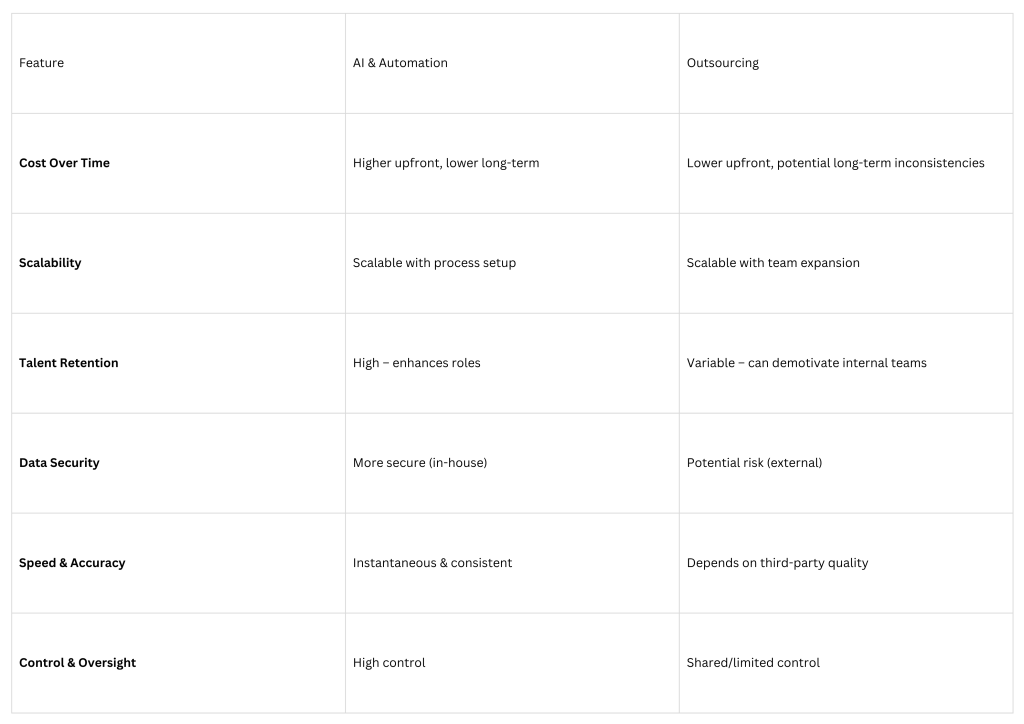AI vs Outsourcing
In today’s fast-paced accounting world, staying competitive doesn’t just mean offering excellent service—it means delivering it faster, smarter, and more efficiently. With workloads growing and the talent pool shrinking, many firms are asking the same question: “Do we scale with AI and automation, or do we outsource?”
Let’s take a closer look at both strategies and weigh the pros, the cons, and the real question at hand: AI vs Outsourcing—what’s best for your practice?

Firm A: The Tech Trailblazers – Embracing AI & Automation
Firm A is future-focused. They’ve invested in smart tools and automation platforms that handle everything from bookkeeping and bank reconciliations to client notifications and reporting. But why?
Why They Use It:
This firm wants scalability without sacrificing control. By automating repetitive, manual tasks, they free up their team to focus on higher-value work like advisory services, relationship building, and strategic planning.The Benefits:
Retention & Recruitment: Accountants want meaningful work. Automation eliminates the tedious grind and helps firms attract and retain top talent.
Accuracy & Speed: Machines don’t get tired or distracted. Processes are faster and more accurate, reducing costly errors.
Real-Time Insights: AI tools give firms real-time data at their fingertips, helping them make quicker, smarter decisions.
Consistency: Unlike outsourcing, there’s no risk of losing knowledge or dealing with inconsistent work quality.
The Cons (Where Outsourcing Might Win):
Initial Investment: AI and automation often come with an upfront cost—time and money to implement and train.
Learning Curve: Some firms struggle with adoption, especially if the team isn’t tech-savvy.
Limited Flexibility in Non-Repetitive Tasks: While great for routine jobs, AI can’t yet replace human judgment in complex or nuanced work.
Firm B: The Global Collaborators – Leveraging Outsourcing
Firm B takes a different approach. Rather than investing in tech, they’ve built a reliable network of outsourced partners—often overseas—to handle key processes.
Why They Use It:
This firm wants to scale operations quickly without expanding payroll. Outsourcing offers immediate manpower without the commitment of hiring full-time staff.The Benefits:
Cost Efficiency: Labour costs in some regions are significantly lower, making outsourcing financially attractive.
Immediate Capacity: Firms can quickly ramp up to handle seasonal spikes, like tax season, without burning out their core team.
Specialist Skills on Tap: Some outsourcing firms offer niche expertise that may be hard to find or train in-house.
The Cons (Where Automation Shines):
Risk of Errors & Inconsistencies: Quality control can be challenging when work is handled externally.
Data Security Concerns: Sharing sensitive client information with third parties always carries some risk.
Time Zones & Communication: Delays, misunderstandings, and time differences can slow progress.
Team Morale: Over-reliance on outsourcing may demotivate internal staff, especially if they feel displaced or undervalued.
AI vs Outsourcing: The Head-to-Head
When it comes to AI vs Outsourcing, the choice is nuanced—and it all depends on what you value most in your practice.

So, which wins? In the battle of AI vs Outsourcing, there’s no universal answer—but there is a clear direction based on your firm’s goals. If you want to modernise, empower your team, and build internal capability, AI and automation may be the stronger long-term play. But if you need short-term relief, extra hands on deck, or rapid capacity increases, outsourcing may fill the gap.
Conclusion: The Future Is in Your Hands
The decision of AI vs Outsourcing is less about technology vs people—and more about strategy. What kind of firm do you want to build? One that’s tech-forward and talent-driven, or one that’s lean, flexible, and globally resourced?
There’s no wrong answer—but there is a right one for you.
And here’s the best part: you don’t necessarily have to choose just one. The smartest firms are already finding a hybrid balance—automating the routine, outsourcing the overflow, and keeping their in-house team focused on what they do best.
In the end, the choice is yours. Just make sure it’s intentional, strategic, and aligned with the future you want to lead.




